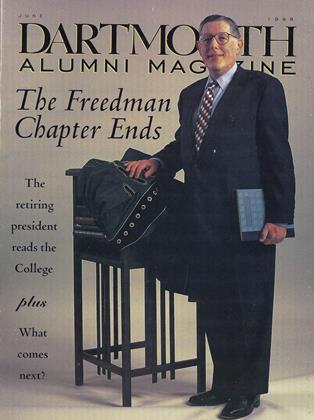Looking Back
It doe3s not pay, if you are a Reagan detractor, to have Dinesh D'Souza '83 on your case. He will easily find something really egregious that you said or wrote in the last ten years, and your wrong opinion at that time conclusively prows that you arc wrong about Reagan. too. Galbraith, Schlesinger, Lester Thurow, Nixon, Reston, even Billy Graham all get this treatment' in D'Souza's very first chapter of Ronald Reagan:Mow an Ordinary Man. Became an Extraordinary (Free Press). While the author scrupulously sources his statements, there are no new historical discoveries. And yet, D'Souza freshly describes a man who was not feared, did not make intellectual waves, knew what the average indifferent citizen wanted, and was unrelenting about that he wanted, such as tax cuts and the defeat of Communism. He doggedly held "Star Wars" over Gorbachey's head until the U.S.S.R. and the Berlin Wail Crumbled. It happened on his watch. So. as H.L. Mencken was reputed to have written to over-zealous and tiresome correspondents, "Dear Sir: You may very well be right."
Much has been written on the "genetic sources of genius." Allen Brooks '49, Emeritus professor: of art history at the University of Toronto, prefers to analyze creative genius from the record of the subject's early,, developmental years. Thus his magnificent and most readable account, .even for the layman, of the first 33 years of the life of Charles Edouard Jeanneivt-Who after intensive travel, writing, painting and designing, must have decided, in 1920, that in adopting, the name of a relative, LeCorbusier he was ready to take his place among the world's best-known and most accomplished architects . Over 20 years (Miringwhich he also Wrote five other books) Brooks was in Switzerland and France accumulating School records, letters home from abroad, diaries; journals, and sketchbooks, for his 5 00-page Le Corbusier. The Formative Years (University of Chicago Press). The book was nominated for the 1998 Pulitzer Prize for biography.
E-Boat Alert: Defending the Normandy Invasion Fleet (Naval Institute Press) by JamesF. Tent '66 records a little-known episode of World-War II that possesses all the drama and suspense of the more major event it could have become. During/the rehearsal for the Normandy invasion, a force of LSTs was demolished by "nine German high-performance motor torpedo boats (E-Boats, the Allies called them). The German navy redoubled its efforts to disrupt the landing area, but thanks go intelligence, photo reconnaissance, and precision bombing by the " British, the E-Boat base was' destroyed before it could wreak further damage. Professor Tent, of the University of Alabama, has a Ph.D. in German history, and his painstaking research into the background of the event is combined with fascinating personal interviews, in the postwar, With the British, American, and German combatants.
 View Full Issue
View Full Issue
More From This Issue
-
 Cover Story
Cover StoryThe Education of a President
June 1998 -
 Feature
FeatureWhat Comes NEXT
June 1998 By Charles Wheelan ’88 -
 Feature
Feature"The Majority of Them Based on High Merit"
June 1998 By Fritz Hier '44 -
 Article
ArticleThe Gospel According to Odysseus
June 1998 By Professor William Scott -
 Article
ArticleBack to the Future
June 1998 By James O. Freedman -
 Article
ArticleNewt ana Other Spring Speakers
June 1998 By "E. Wheelock"
Article
-
 Article
ArticleTHE ATHLETIC COUNCIL
JULY 1931 -
 Article
ArticleLaughs Save Lives
November 1943 -
 Article
ArticleTabulation of Income and Expense for 1943-44
November 1944 -
 Article
Articlealumni ship
April 1960 -
 Article
ArticleShindig!
SEPTEMBER | OCTOBER 2015 By —Reported by Lexi Krupp ’15 -
 Article
ArticleMeditation Two
MARCH 1963 By RICHARD EBERHART '26

